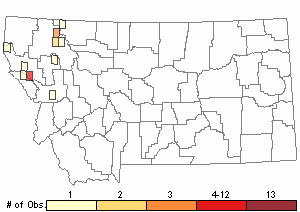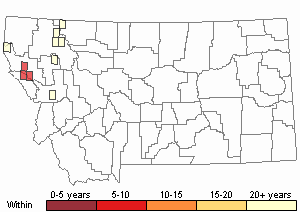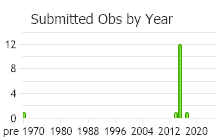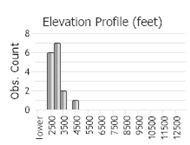View in other NatureServe Network Field Guides
NatureServe
Montana
Utah
Wyoming
Idaho
Wisconsin
British Columbia
South Carolina
Yukon
California
New York
Necker's Thamnobryum Moss - Thamnobryum neckeroides
Other Names:
A Tree Moss
General Description
Plants: Green to chartreuse, glossy to dull, (4-)6-8(-10.5) cm (FNA 2014), the main stem creeping, developing a stipe-like upright or inclined secondary stem that branches above in a somewhat dendroid fashion. Branches 1-5 cm in length, often slender and whip-like (Lawton 1971).
Leaves: Secondary stem leaves upright to erect-spreading, cupped, egg-shaped, 2-3.2 mm in length, 1-1.7 mm in width (FNA 2014). Branch leaves overlapping, their apices curving upward and inward when dry, smaller near the branch ends (Lawton 1971), egg-shaped or nearly boat-shaped, conspicuously concave, 1-2.2 mm in length, 0.5-0.8 mm in width; apex widely acute to broader, rounded; margins at the apex serrate (FNA 2014), flat; costa solitary, stout at the base, narrowing toward and not reaching the apex, toothed on the adaxial side (Lawton 1971).
Leaf Cells: Basal and upper medial cells 4-sided, sometimes very narrow; medial cells next to costa long and diamond-shaped, the longest axis running the same direction as the costa; apical cells nearly square to short and diamond-shaped (FNA 2014).
Diagnostic Characteristics
Dioicous. Fruit seldom produced. Seta reddish-brown (FNA 2014), 1 cm in length, upright or bowed. Capsule brown, upright or occasionally slanting from the bowed seta; theca ca 2 mm in length, contracted under the mouth when dessicated (Lawton 1971).
Range Comments
Canada: BC; USA: AK, CA, CT, ID, MT, NY, NC, OH, OR, PA, WA; Europe; Asia (FNA 2014). In Montana: Flathead, Lake, Lincoln, and Sanders Counties (Elliott & Pipp, 2016).
Observations in Montana Natural Heritage Program Database
Number of Observations: 26
(Click on the following maps and charts to see full sized version)
Map Help and Descriptions
Relative Density

Recency



 (Observations spanning multiple months or years are excluded from time charts)
(Observations spanning multiple months or years are excluded from time charts)
Habitat
Shaded banks, bluffs, boulders, tree bases (FNA 2014), soil, rock and humus in calcareous habitats (Elliott & Pipp, 2016) in areas influenced by a Pacific maritime climate. Occurs from lowlands to 6560 feet.
Reproductive Characteristics
Dioicous. Fruit seldom produced. Seta reddish-brown (FNA 2014), 1 cm in length, upright or bowed. Capsule brown, upright or occasionally slanting from the bowed seta; theca ca 2 mm in length, contracted under the mouth when dessicated (Lawton 1971).
Stewardship Responsibility
References
- Literature Cited AboveLegend:
 View Online Publication
View Online Publication Elliott, J.C. and A.K. Pipp. 2018. A Checklist of Montana Mosses (1880-2018). Updated 3 January, 2020. Montana Natural Heritage Program, Helena, Montana. 73 pp.
Elliott, J.C. and A.K. Pipp. 2018. A Checklist of Montana Mosses (1880-2018). Updated 3 January, 2020. Montana Natural Heritage Program, Helena, Montana. 73 pp. Flora of North America Editorial Committee, eds. 2014. Flora of North America North of Mexico. Volume 28. Bryophytes: Mosses, Part 2. Oxford University Press, Inc., NY. xxi + 702 pp.
Flora of North America Editorial Committee, eds. 2014. Flora of North America North of Mexico. Volume 28. Bryophytes: Mosses, Part 2. Oxford University Press, Inc., NY. xxi + 702 pp. Lawton, E. 1971. Moss Flora of the Pacific Northwest. Hattori Botanical Laboratory. Japan: Yamabuki-cho, Shinjuku-ku, Tokyo. 362 pages plus appendices.
Lawton, E. 1971. Moss Flora of the Pacific Northwest. Hattori Botanical Laboratory. Japan: Yamabuki-cho, Shinjuku-ku, Tokyo. 362 pages plus appendices.
- Additional ReferencesLegend:
 View Online Publication
View Online Publication
Do you know of a citation we're missing? Elliot, J. C. 1993. Second checklist of Montana mosses. Unpublished report. U.S. Forest Service, Region 1. Missoula, MT. 45 pp.
Elliot, J. C. 1993. Second checklist of Montana mosses. Unpublished report. U.S. Forest Service, Region 1. Missoula, MT. 45 pp. Lawton, E. 1971. Keys for the Identification of the Mosses on the Pacific Northwest. Reprinted from 'Moss Flora of the Pacific Northwest'. Published as Supplement No. 2 of the Journal of the Hattori Botanical Laboratory. Nichinan, Miyazaki, Japan. 66 pp.
Lawton, E. 1971. Keys for the Identification of the Mosses on the Pacific Northwest. Reprinted from 'Moss Flora of the Pacific Northwest'. Published as Supplement No. 2 of the Journal of the Hattori Botanical Laboratory. Nichinan, Miyazaki, Japan. 66 pp. Malcolm, B., N. Malcolm, J. Shevock, and D. Norris. 2009. California Mosses. Nelson, New Zealand: Micro-Optics Press. 430 pp.
Malcolm, B., N. Malcolm, J. Shevock, and D. Norris. 2009. California Mosses. Nelson, New Zealand: Micro-Optics Press. 430 pp.
- Web Search Engines for Articles on "Necker's Thamnobryum Moss"





